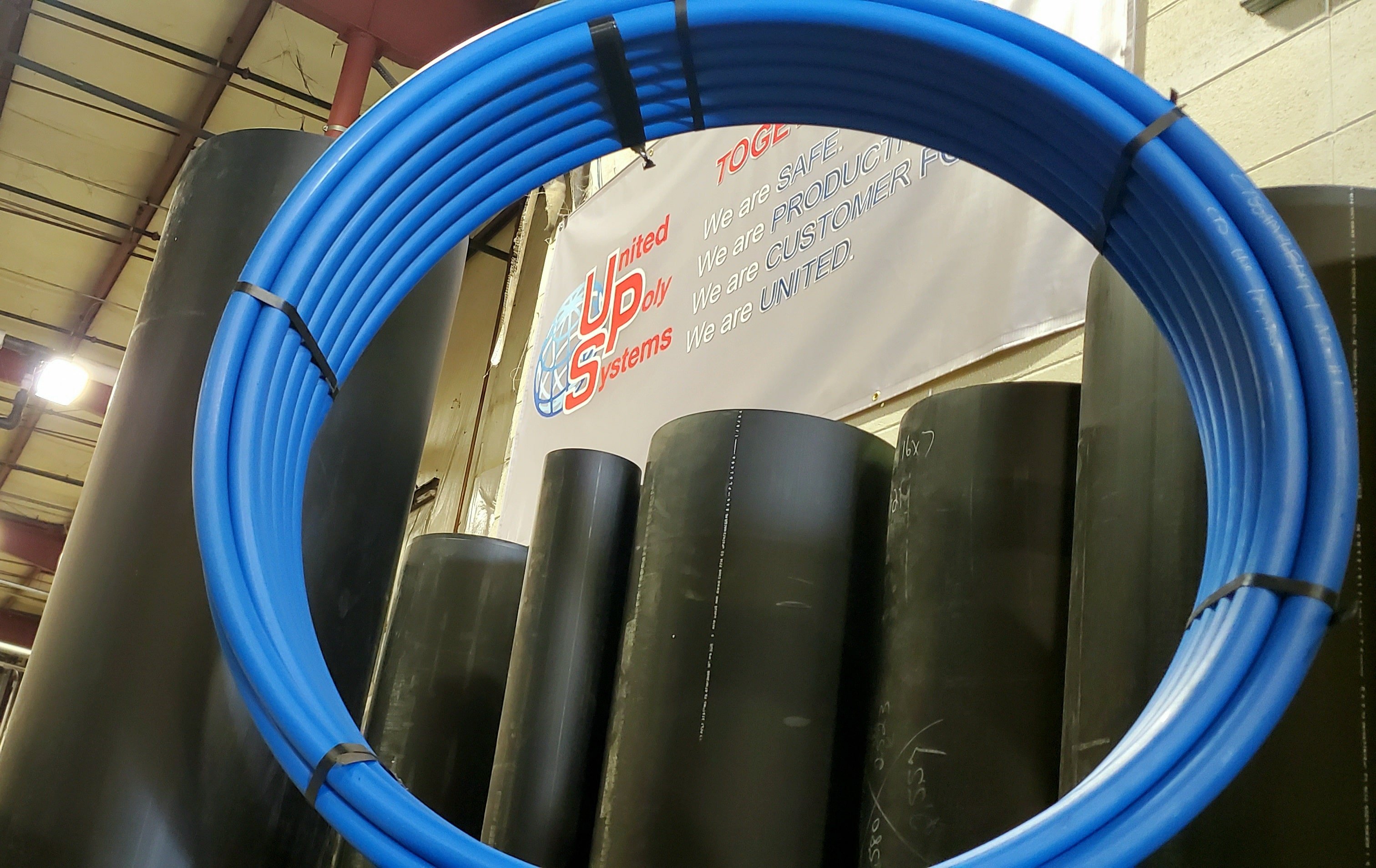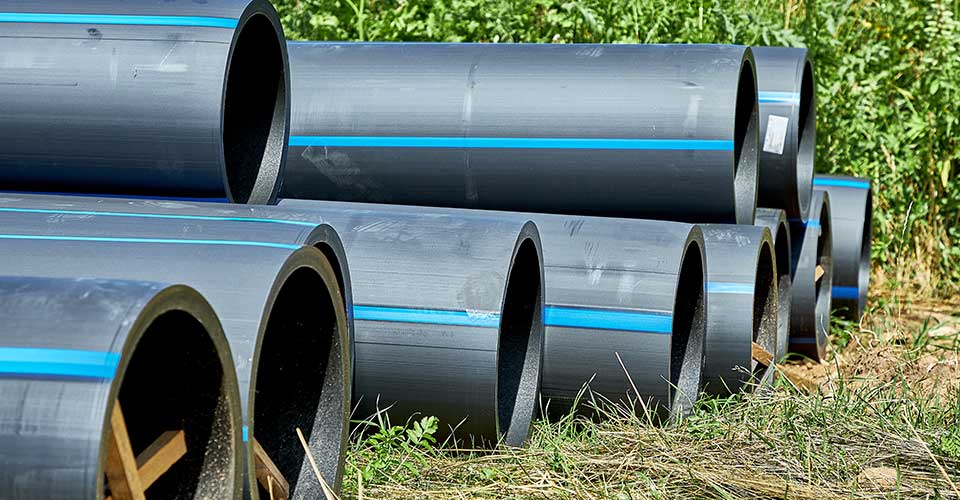A Comprehensive Overview to the Different Uses HDPE Pipeline in Building And Construction and Market
HDPE pipelines have actually become a critical component in modern-day building and commercial applications. Their unique homes, such as resistance to rust and light-weight design, make them appropriate for a wide variety of usages. From supply of water systems to agricultural watering, HDPE pipelines use remedies that boost performance and sustainability. Recognizing their varied applications is crucial for professionals seeking to maximize framework. What details benefits do these pipelines give each industry?
Water System and Distribution Systems
Water supply and circulation systems are important elements of urban framework, commonly depending on high-density polyethylene (HDPE) pipes for their sturdiness and efficiency. These systems transportation safe and clean water from therapy facilities to customers, making sure ease of access and safety. HDPE pipelines are favored for their resistance to deterioration, chemicals, and extreme temperatures, which improves their longevity and decreases maintenance expenses. Additionally, their lightweight nature enables much easier setup and transportation, making them ideal for numerous urban and country applications.
The versatility of HDPE pipes allows them to be set up in limited areas and around obstacles, reducing the demand for substantial excavation (Midland TX HDPE Pipe Fittings in Stock). Their smooth indoor surface reduces friction losses, boosting water flow prices. As cities continue to expand, the need for trusted water system systems increases, positioning HDPE pipelines as a sustainable remedy for modern facilities tasks. Their tried and tested track document makes them a favored choice among engineers and urban organizers alike
Wastewater Management and Treatment
Reliable wastewater administration and therapy are vital for preserving public wellness and ecological quality. HDPE pipes play a vital role in this process due to their sturdiness, resistance to deterioration, and ability to hold up against severe chemicals. These pipelines are commonly used in different applications, consisting of sewage systems, stormwater water drainage, and wastewater treatment facilities. Their lightweight nature assists in less complicated installment and transportation, reducing labor expenses and time.
In enhancement, HDPE pipes have a smooth indoor surface that decreases rubbing loss, promoting reliable circulation rates. They are additionally less vulnerable to leakages and failings compared to typical products, guaranteeing that contaminants are contained successfully. In addition, their flexibility enables for flexibility in various soil problems, making them ideal for diverse environmental settings. As sectors increasingly prioritize sustainable techniques, the use of HDPE pipelines in wastewater monitoring systems aligns with goals for minimizing ecological effect and improving source healing.
Agricultural Watering Solutions
In farming setups, reliable watering solutions are vital for enhancing plant returns and taking care of water sources. HDPE (High-Density Polyethylene) pipelines play a vital role in modern irrigation systems as a result of their durability, flexibility, and resistance to rust. Their capability to hold up against high pressures makes them excellent for both surface and subsurface irrigation applications, making sure consistent water distribution throughout areas.
Farmers can utilize HDPE pipes in drip irrigation systems, which provide water directly to plant origins, lessening wastefulness and promoting healthy and balanced growth. Additionally, these pipes are lightweight and very easy to install, reducing labor expenses and installation time. Their lengthy lifespan and low maintenance needs better enhance their charm in agricultural practices.
HDPE pipelines are ecologically pleasant, as they pop over to this web-site can be recycled and do not leach damaging chemicals into the soil. This makes them a lasting choice for farmers intending to adopt green agricultural techniques while making the most of performance.
Industrial Applications and Procedures
Flexibility is a trademark of HDPE pipes, making them indispensable in numerous industrial applications and procedures. These pipelines are commonly utilized in chemical handling industries as a result of their superb resistance to a vast array of corrosive materials. HDPE's light-weight nature, combined with high tensile strength, enables easy installment and long-lasting performance sought after environments.
In the oil and gas industry, HDPE pipes play a crucial function in transferring hydrocarbons and gases, many thanks to their durability and adaptability click here for more - American Plastics HDPE Pipe Manufacturing. Additionally, they are utilized in mining procedures for the transportation of slurry and other materials, where standard piping systems may fail
HDPE pipelines are significantly utilized in producing facilities for water supply lines and wastewater management. Their ability to endure extreme temperature levels and stress makes them ideal for a selection of commercial procedures. Generally, HDPE pipelines contribute significantly to effectiveness and security throughout varied commercial applications.
Stormwater Monitoring and Water Drainage Equipments
Stormwater administration and drainage systems are vital components in urban framework, created to handle excess rainfall and reduce flooding dangers. High-density polyethylene (HDPE) pipes are significantly made use of in these systems because of their sturdiness, flexibility, and resistance to rust. These pipes successfully deliver stormwater away from booming areas, minimizing surface area runoff and protecting against waterlogging.
HDPE's lightweight nature helps with easier installation, minimizing labor costs and building time. Additionally, its resistance to chemicals and ecological stress factors guarantees long life and integrity in different environments. Find Out More In enhancement to conventional water drainage applications, HDPE pipelines are also used in ingenious services such as environment-friendly facilities, which consists of rain gardens and absorptive pavements.

Regularly Asked Concerns
Just How Does HDPE Pipe Compare to PVC Pipeline in Price?
Generally, HDPE pipe has a tendency to be extra pricey than PVC pipeline as a result of its enhanced toughness and versatility. However, long-term price factors to consider, such as maintenance and life expectancy, might favor HDPE in certain applications.

What Is the Life-span of HDPE Pipes Under Varying Conditions?
HDPE pipelines usually have a lifespan of 50 to 100 years, depending on ecological conditions, installation techniques, and use. Aspects such as temperature level, soil type, and direct exposure to chemicals can greatly affect their longevity.
Can HDPE Piping Be Recycled After Usage?
Yes, HDPE pipes can be recycled after usage. The recycling process entails thawing down the material, permitting it to be repurposed right into new items, therefore advertising sustainability and decreasing environmental influence connected with plastic waste.
Are There Any Kind Of Certain Installation Obstacles With HDPE Pipelines?
Installation obstacles with HDPE pipes include appropriate jointing techniques, making certain appropriate trench conditions, and managing thermal development. Furthermore, experienced labor is required to take care of specific equipment, which can make complex the setup process in different environments.

What Qualifications Should I Try To Find When Investing In HDPE Pipes?
When acquiring HDPE pipelines, one need to try to find qualifications such as ASTM, AASHTO, and ISO, which verify high quality and compliance with sector requirements, ensuring resilience and performance in numerous applications. - American Plastics HDPE Pipe for Oilfield